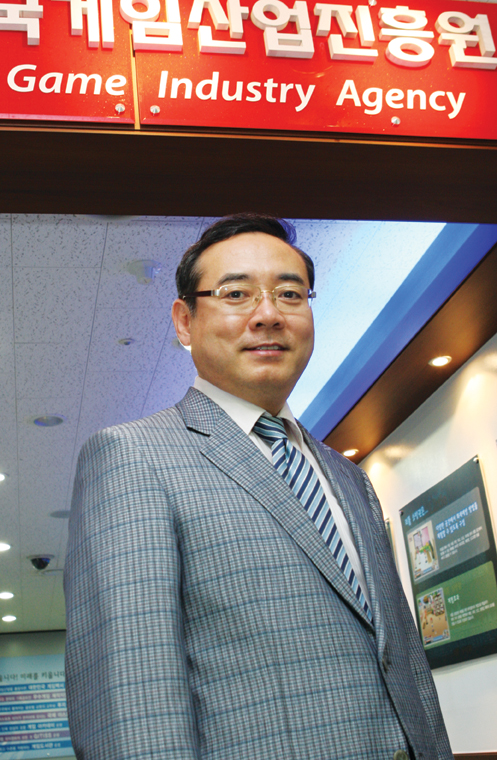 Bright Future for Game Industry
Bright Future for Game Industry
EVP Seo of Korea Game Industry Agency confident Korea to rank among big 3 game countries in world in 2012
Following is a written interview with Executive Vice President Seo Tae-geon of the Korea Game Industry Agency:
Question: What is the current status of the game industry in Korea and the level of its international prestige?
Answer: The game industry entered an age of 1 trillion won a year in exports with the projected total of game industry exports hitting $1.06 billion in 2008, up 35 percent from the previous year. According to the white paper on the game industry in Korea issued in 2007, the domestic game market was expected to reach 5.14 trillion won with exports amounting to $781 million in 2007. Looking at the rapid growth of online and video games, the total market for 2008 is likely to reach 6.04 trillion won, up 17.4 percent from the previous year.
In particular, online games, which take up a large portion of the industry, have very good prospects as the global game market has been growing more than 20 percent annually and the online game infrastructure has also been expanding around the world, giving the domestic game industry great hope. A noteworthy development is the fact that the game industry has been fostering the development of multiple platforms, a base for global service, by providing support to 300 individual game companies in the area of education in a bid to take a bigger share of the world's game contents market.
The industry is in the middle of building an arcade game complex with the government's support and will build a global game hub in cooperation with Microsoft. The industry has also been boosting its international image through exhibitions overseas to show the world the excellence of Korean online and video games.
Q: What is the result of G-Star 2008 and projected export negotiations?
A: G-Star is the only international game exhibition and attracted some 190,000 viewers in 2008, the largest turnout for the event so far held. Domestic game makers such as NHN, JC Entertainment, CJ Internet and Mobicle have been able to conclude export contracts worth $3 million, in addition to holding 980 export talks with overseas buyers at the event. CJ Internet, in particular, has signed an export contract for its 'minifighter' game with Ferry Game of China, a new game company, and has also signed a contract for a tie-up to enter the game ads market in Japan with large service contracts following one after another. I'm so glad that the game industry's efforts to introduce its new games overseas paid off at the G-Star event.
Q: What measures are you taking to strengthen the game industry's competitive edge?
A: I think a crisis is also an opportunity. The game industry, which has been doing well despite the adverse economic conditions, has boosted its position as a loyal son in the export industry and has also received a shot in the arm from the announcement of the second-year of the mid-to-long-term plan for the development of the game industry on Dec. 3. Shares of game companies have climbed amid the economic slump, finding its place as one of the nation's core industries (as announced by Mirae Asset on Dec. 8). The industry's game exports have been rising lately, but it still needs continuous government and societal support to firm up its place as a stable industry in an advanced game country. Under the plan, the government will invest 350 billion won in support of the industry in various ways including advancement into the global game market; setting up a base for the development of next generation games; the training of future manpower and the development of new technologies; the creation of game culture value; upgrading distribution channels for games; leading the world in e-sports; and the systematization of fusion system policies, among others. The game industry's future will become brighter with society's support, nurturing and broader understanding of the industry as a national strategic industry.
Q: How is the game industry's overseas advancement taking shape lately and what are the plans for its next move?
A: Each game company has been turning its eyes overseas to expand exports rather than focusing on the domestic market. Taking advantage of its superior technology, the industry will develop high-quality games to expand its exports. The Korea Game Industry Agency has a public relations officer at the Korea Cultural Center in Los Angeles and another at its China office in a bid to strengthen ties with key game publishers and governments and to build networks.
Game companies have been looking to expand the number of importing countries for their games, not satisfied with the current international client base, which will ensure new and stable incomes for those companies.
Exports of games will expand continuously, I think, with the government projects to elevate Korea to among the top three game exporting countries in the world by 2012, with Korea taking a 10 percent share of the world game market. nw
Executive Vice President Seo Tae-geon of the Korea Game Industry Agency.
3Fl, 292-47, Shindang 6-dong, Chung-gu, Seoul, Korea 100-456
Tel : 82-2-2235-6114 / Fax : 82-2-2235-0799